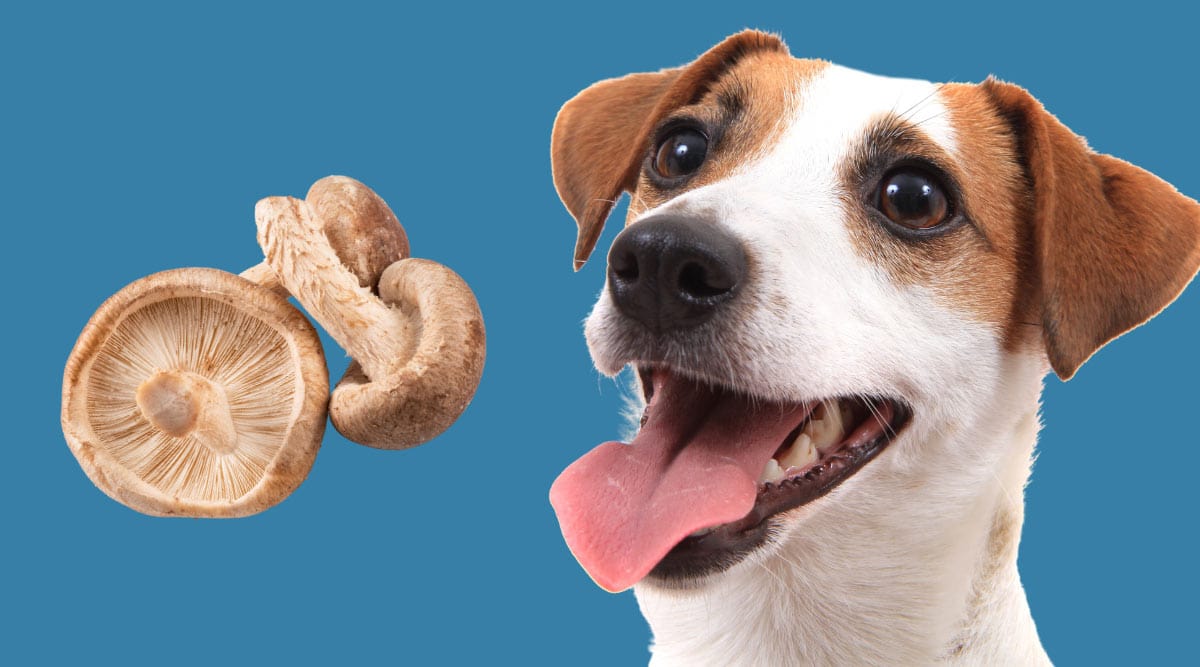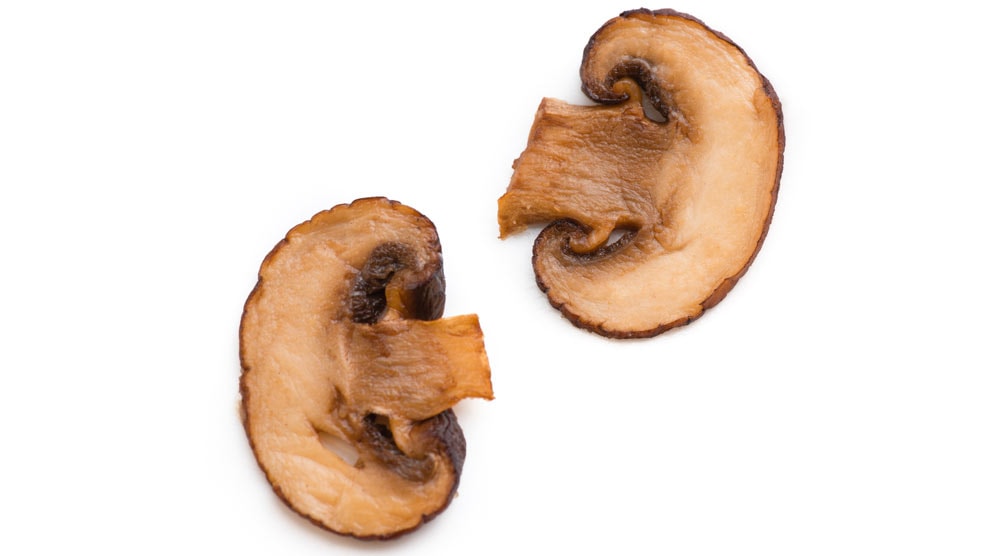Ever wondered if dogs can eat shiitake mushrooms? They certainly can!
These mushrooms aren’t just safe for dogs when cooked and served in moderation, but could also provide a range of nutrients. Let’s explore the potential health benefits and risks of feeding your furry friend these tasty fungi.
Contents
What Are Shiitake Mushrooms?
Shiitake is an edible brown mushroom predominantly grown in Japan.
With their hearty brown caps, shiitake are consumed like a vegetable in many traditional Asian dishes. They’ve also been used as a traditional medicine for thousands of years.
Feeding shiitake mushrooms to your dog might sound strange. But there are actually some potential health benefits to dogs consuming these mushrooms in small quantities.
Are Shiitake Mushrooms Safe For Dogs?
The short answer? Yes, cooked shiitake mushrooms are safe, and non-toxic for dogs. Fed in moderation and without seasonings, these mushrooms can provide a variety of beneficial nutrients to your dog.
However, there’s a caveat. Overfeeding your dog shiitake mushrooms, or feeding them uncooked mushrooms, may lead to stomach upsets.
Like any new food, shiitake should also be introduced gradually and in small quantities. This gives your dog’s digestive system time to adjust.
Allergies are another potential concern. While not a common allergen, shiitake mushrooms, like any food, may trigger allergies in some dogs. It’s important to watch your dog for any signs of illness when you give them a new type of food.
Nutrients in Shiitake Mushrooms That May Be Beneficial to Dogs
Shiitake mushrooms come packed with potentially beneficial nutrients that can boost your dog’s overall health. Here are some of the most important:
- Fibre: With their rich dietary fibre content, shiitake mushrooms can aid your dog’s digestion and provide a feeling of fullness. Being low in calories, they’re an excellent snack for dogs on a weight loss journey.
- Protein: A source of varied amino acids, shiitake mushrooms contribute to numerous essential body processes.
- Vitamin D: Unlike humans, dogs derive most of their vitamin D from their diet rather than sunlight. This crucial nutrient aids bone health, hormone function, and the immune system.
- Eritadenine: This unique compound can potentially lower cholesterol levels in dogs, promoting heart health.
- B vitamins: Shiitake mushrooms are rich in B vitamins, especially niacin (B3), B5, and B6, which are critical for various bodily functions.
- Zinc: Zinc is crucial for wound healing and supports many hormones. For more information, check out this resource on why zinc is important for your dog.
- Selenium: Selenium is a trace mineral involved in thyroid function and skin health.
- Copper: Copper aids in iron absorption and red blood cell production in dogs. It also contributes to healthy hair and connective tissue.
Health Benefits of Dogs Eating Shiitake Mushrooms
Shiitake mushrooms are packed with nutrients and may provide a range of health benefits. However, they should never replace a nutritionally complete dog food.
Your dog’s regular meals should provide all of a dog’s nutrient needs in the right proportions. With that said, occasionally treating your pet to shiitake mushrooms can still be beneficial.
Important: The potential benefits below are often based on studies conducted on other animals or humans. While the effects are likely similar in dogs, we can’t state this with absolute certainty.
May Support a Healthy Immune System
Shiitake mushrooms contain many nutrients that bolster the immune system and reduce inflammation. For example, shiitake contains vitamin D, selenium, zinc, copper, and iron which all play essential roles in the immune system.
Shiitake mushrooms also contain a natural form of interferon. This protein helps the body’s immune system combat cancerous cells, viruses, and other unwelcome invaders. Additionally, shiitake mushrooms contain lentinan, which aids the immune system in warding off viruses and bacteria.
May Support a Healthy Cardiovascular System
Just like us, dogs are susceptible to high cholesterol, increasing their risk of heart disease. Shiitake mushrooms contain eritadenine, a compound that suppresses the enzymes that produce cholesterol in your dog’s body.
A bonus is that shiitake mushrooms are low in unhealthy fats and sodium, making them a heart-friendly choice.
Natural Source of Vitamin D
Vitamin D is integral to your dog’s health. For example, it regulates calcium and phosphate levels, which are crucial for healthy bones and muscles.
Unlike humans, dogs get most of their vitamin D from food, not sunlight. Shiitake mushrooms can be an excellent source of vitamin D.
Related Article: Why Do Dogs Sunbathe?
May Help With Canine Brain Health
The B vitamins in shiitake have been linked to brain health. This suggests that including shiitake mushrooms in your dog’s diet could contribute to their mental wellbeing.
Health Risks of Dogs Eating Shiitake Mushrooms
While shiitake mushrooms are generally safe and non-toxic for dogs, there are still risks to giving your pet this food.
The most common mistake is feeding too many shiitake mushrooms. This could cause gastrointestinal issues, leading to symptoms such as:
- Stomach upset
- Vomiting
- Bloating
Should you spot any of these signs, it’s crucial to contact your vet right away. These symptoms could lead to dehydration if left untreated.
To reduce the chance of a stomach upset, only feed small amounts of shiitake mushrooms on an infrequent basis. It’s also important to cook the mushrooms, as dogs struggle to digest the fibre in raw mushrooms.
Additionally, always chop up mushrooms into small pieces before cooking. Pieces that are too large for your pet could be a choking hazard.
Another potential risk is an allergic reaction to shiitake mushrooms. As with any new food, gradually introduce it into your dog’s diet and stay alert for signs of allergies. Some common symptoms of food allergies in dogs include:
- Itchy skin
- Gastrointestinal problems like diarrhea and vomiting
- Chronic gas
- Skin infections
- Hives
- Anaphylaxis
How To Feed Your Dog Shiitake Mushrooms
When serving shiitake mushrooms to your dog, always ensure they are thoroughly washed and chopped into bite-sized pieces. The right size depends on your dog’s breed and size.
Then, once chopped, steam or boil the mushrooms to make them easier to digest. Avoid adding seasoning, as many spices and herbs can be harmful to dogs
Lastly, remember to serve shiitake mushrooms in small quantities. For the first introduction, only give a tiny amount and keep a close eye on your dog for any adverse reactions to the food.
Summary
Shiitake mushrooms, when cooked and unseasoned, are safe for dogs to eat. They also contain a range of nutrients that may benefit your pet’s health.
However, it’s essential to only feed them to your dog in moderation to prevent stomach upset. You should also talk to your vet before introducing any new foods into your dog’s diet.


